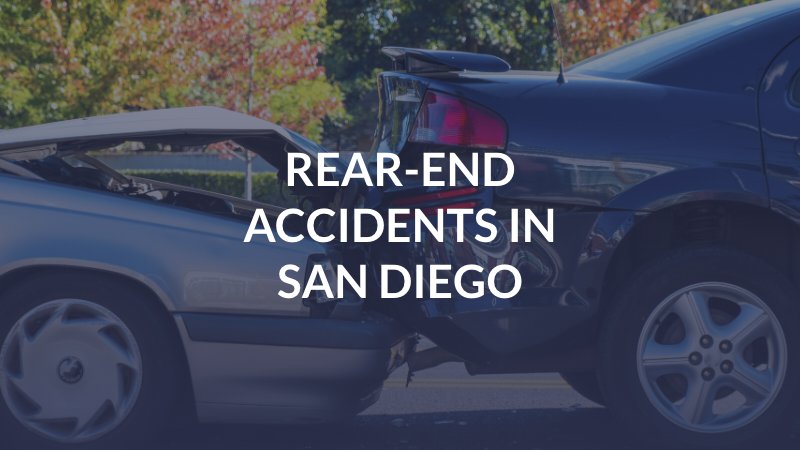
Rear-end collisions account for about 30 percent of all car accidents across the nation every year. However, statistically speaking, rear-end collisions are much more likely to occur in urban parts of the country, including cities like San Diego.
In fact, according to state crash data, rear-end collisions are the most common type of car accident in San Diego, California. In 2023, 1,808 rear-end car accidents were reported across the city, accounting for 31.58 percent of all collisions.
Rear-end car accidents are, most often, the result of driver negligence. Simple mistakes at the wheel prevent drivers from stopping their vehicles when there’s a change in traffic.
As the victim of a San Diego rear-end accident, it’s important to explore your rights. You may have the opportunity to seek compensation for resulting property damage, medical bills, lost wages, and distress, and an experienced San Diego auto accident lawyer can help you realize the best possible results.
What Causes Most Rear-End Collisions?
In a rear-end collision, the front end of one vehicle strikes the rear of the vehicle in front of it. Sometimes, this can create a chain reaction, which is a collision involving multiple vehicles.
Why would a driver crash into the vehicle in front of them?
Most often, it’s because they’re:
- Texting and driving
- Distracted in some other way
- Under the influence of drugs or alcohol
- Tailgating (following too closely)
- Suffering from road rage and driving aggressively
- Making unsafe lane changes
- Driving while overly fatigued or drowsy
Motorists in San Diego are encouraged to leave a safe distance between vehicles when driving. Typically, a driver should leave a three-second cushion. You can calculate this by finding a fixed object, determining when the vehicle in front of you passes it, and then seeing how long it takes for you to pass it, too. In dry weather conditions, it should take you at least three seconds, if not longer.
Vehicles, especially those traveling at high rates of speed, need adequate time and space to come to a complete stop. When drivers aren’t alert and/or if they’re not leaving enough space between vehicles, rear-end collisions are much more likely to occur.
Why Are Rear End Collisions Common in Cities Like San Diego?
Traffic moves differently in cities than in more rural parts of the country.
In rural areas, fewer cars share the road and have more freedom to move. There’s more room for error.
In cities, thousands of vehicles can share the road at once. Several roads converge, with smaller roads connecting to larger thoroughfares. Many times, interstates and highways are under construction, which adds to congestion and traffic delays, creating stop-and-go conditions.
When drivers are stuck in traffic or moving slowly through a city’s highways, they’re more likely to:
- (a) get annoyed and engage in aggressive maneuvers, and
- (b) get distracted.
Both of these things make rear-end collisions much more likely as motorists check their phones, talk with passengers, and refuse to merge properly as other vehicles enter and/or exit the road.
Are Rear-End Collisions Dangerous?
Rear-end collisions are the most common type of car accident, but they’re perhaps the least likely to be fatal. In 2023, 9 people were killed in San Diego rear-end car accidents.
While rear-end wrecks aren’t known for usually being deadly, they can still cause a lot of damage. At least 2,645 people were injured in San Diego rear-end collisions in 2023, including 83 who sustained suspected serious injuries.
Rear-end crash victims often experience:
- Whiplash
- Soft tissue injury
- Bruising and contusions
- Concussion injury
- Traumatic brain injury
- Chest injury
- Seat belt injury
- Airbag injury
- Spinal cord injury
- Back injury
- Neck injury
Neck injuries - particularly soft-tissue injuries like whiplash - are the most commonly reported rear-end car accident injuries, and for good reason. In a rear-end collision, it’s common for vehicle occupants to continue moving forward upon impact. Seat belts then tighten, holding the occupants’ bodies in place. However, their heads are unrestrained and continue to move forward. When the head moves as far forward as possible, it often jerks back rapidly. This violent overextension puts a lot of strain on the neck’s tendons, ligaments, muscles, bones, and other tissue, resulting in serious neck injuries.
Is the Rear Driver Always Liable For a Rear-End Collision?
Not necessarily. Most times, yes, the driver of the rear vehicle will share at least some (if not most) of the blame for a rear-end accident. California has laws in place requiring motorists to leave an adequate space between vehicles when driving. When there’s a rear-end collision, it usually happens because the rear driver fails to leave a safe following distance between them and the car in front of them.
However, collisions aren’t always straightforward.
There are times when the driver of the lead vehicle will share the blame or be entirely at fault. This can happen if the lead driver is distracted at a red light or stop sign, makes an illegal U-Turn, cuts off another vehicle in traffic, or stops abruptly without a reason.
The only way to determine liability is to conduct a thorough investigation and understand exactly why a rear-end collision happened.
Singleton Schreiber Can Help You Maximize Your Recovery After a Rear-End Crash in San Diego, CA
You deserve to be compensated if you’ve been injured in a rear-end collision in San Diego because someone else was negligent. However, you shouldn’t have to navigate a complex car accident lawsuit on your own, especially when you’re going up against a tough insurance company.
Hiring an experienced San Diego personal injury lawyer to represent you can offer the support, guidance, and resources you need to make the most of your fight for compensation.
Rear-end crash victims in San Diego consistently choose Singleton Schreiber because we’re trustworthy, award-winning California trial attorneys with a proven ability to make a difference in the lives of the people we represent. As passionate advocates, we’ve successfully recovered over $3 billion in damages.
You’ll only have a short amount of time to seek compensation from a negligent driver after a rear-end collision in San Diego. California state law gives you two years from the date of your crash to file a car accident lawsuit. So, don’t hesitate to contact our San Diego, CA, law office to schedule a time for your free case evaluation. Members of our team are always available to take your call.
About Car Accidents
- Car Accident Overview
- Damages Available in Car Accident Cases
- Getting a Car Accident Report in San Diego
- How Long Does it Take to Settle a Car Accident Claim?
- Insurance Minimums
- Liability in Car Accidents
- Steps to Take After a Car Accident
- Time Limits for Car Accident Claims in California
- What is My Car Accident Claim Worth?
Car Accident Injuries
- Airbag Injuries
- Bone Fractures
- Bruising and Contusions
- Chest Injuries
- Delayed Injuries
- Internal Injuries
- Herniated Disc
- Low-Impact Car Accident Injuries
- Nerve Damage
- Seatbelt Injuries
- Soft Tissue Injuries
- Whiplash
Types of Car Accidents
- Aggressive Driving Accidents
- Auto Defect Accidents
- Dangerous Road Accidents
- Distracted Driving Accidents
- Drowsy Driving Accidents
- Drugged Driving Accidents
- Drunk Driving Accidents
- Fatal Accidents
- Head-On Accidents
- Highway Accidents
- Hit-and-Run Accidents
- Intersection Accidents
- Rear-End Accidents
- Rental Car Accidents
- Road Rage Accidents
- Rollover Accidents
- Sideswipe Accidents
- Speeding Accidents
- Tailgating Accidents
- T-Bone Accidents
- Uninsured/Underinsured Motorist Accidents
- Weather-Related Accidents
- Work Zone Accidents




